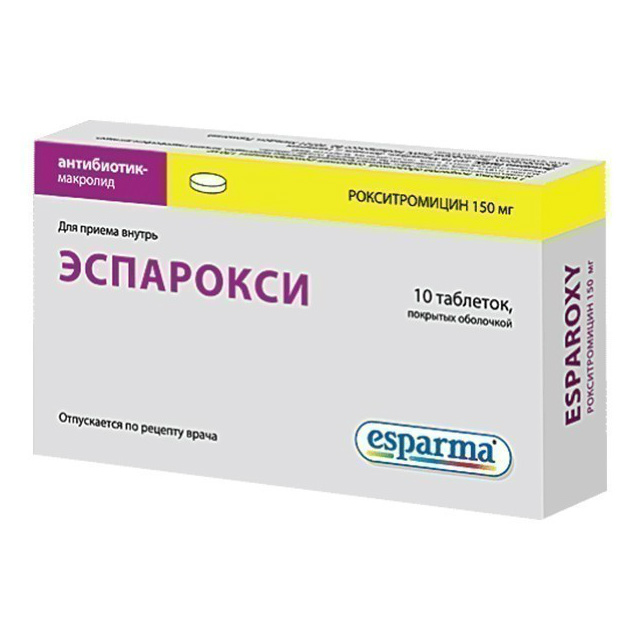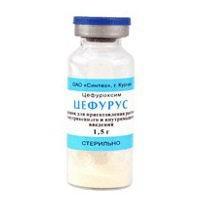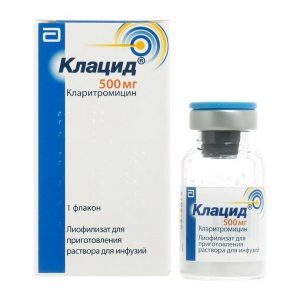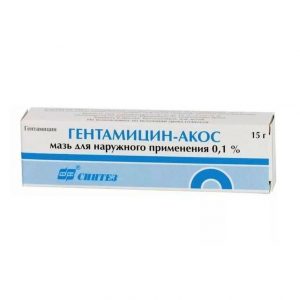Description
Latin name
ESPAROXY
Release form
White-coated tablets, round, biconvex.
packaging 10 pcs
Pharmacological action
Semi-synthetic antibiotic of the macrolide group for oral administration. It has a bacteriostatic effect: by binding to the 50S subunit of ribosomes, it inhibits translocation and transpeptidation reactions, the formation of peptide bonds between amino acids and the peptide chain, inhibits protein synthesis by ribosomes, as a result of which inhibits the growth and reproduction of bacteria. In vitro
are susceptible to the preparation: Streptococcus agalactiae, Streptococcus pneumoniae (Pneumococcus), Neisseria meningitides (Meningococcus), Listeria monocytogenes, Mycoplasma pneumoniae, Chlamydia trachomatis, Uralapticella bibliella, Helrellus campella, Ureaplasma vulgaris, Campbellum catarrhalis (Branhamella catarrhalis), Haemophilus ducreyi.
The following microorganisms demonstrated in vitro variable sensitivity: beta-hemolytic group A streptococcus (Streptococcus pyogenes), Staphylococcus aureus, Haemophilus influenzae, Staphylococcus epidermidis.
Indications
Infections of mild to moderate severity caused by drug-sensitive pathogens:
– lower respiratory tract – acute bronchitis, pneumonia caused by Streptococcus pneumoniae, SARS caused by Mycoplasma pneumoniae srdlkitis tonsillitis – ENT otitis media caused by beta-hemolytic group A streptococcus and Streptococcus pneumoniae
– skin and soft tissues – erysipelas, pyoderma caused by Staphylococcus aureus and group A beta-hemolytic streptococcus
– urinary tract – urethritis in men, anny Chlamydia trachomatis and Ureaplasma urealyticum.
Contraindications
– hypersensitivity
– concomitant use of ergotamine, dihydroergotamine (risk of developing symptoms of “ergotism”), cisapride, pimozide. astemizole and terfenadine
– pregnancy
– lactation period
– children under 12 years old and weighing less than 40 kg, taking into account the given dosage regimen
– for dosage forms containing lactose (optional): lactose intolerance.
Caution: liver failure (cirrhosis with jaundice and / or ascites), renal failure, old age, simultaneous administration with colchicine, dopaminostimulants – ergot alkaloids (including bromocriptine, cabergoline, lisuride, pergolid), cyclosporine, theophylline.
Use during pregnancy and lactation
Contraindicated in pregnancy, during lactation.
Composition
1 tab.
roxithromycin 150 mg
Excipients: corn starch – 88.86 mg, lactose monohydrate – 78.43 mg, calcium hydrogen phosphate dihydrate – 30 mg, magnesium stearate – 9.71 mg, talc – 5 mg, colloidal silicon dioxide – 11.43 mg, sodium glycolate – 6.57 mg.
Shell composition: hypromellose – 5 mg, talc – 7.14 mg, titanium dioxide – 1.71 mg, macrogol 4000 – 2.14 mg.
Dosage and administration
Inside, adults – 150 mg 2 times a day, morning and evening, before meals or 300 mg once. The course of treatment is determined individually depending on the indications, the severity of the infectious process and the activity of the pathogen in infections caused by beta-hemolytic streptococcus, the course of treatment should be at least 10 days. With liver failure – 150 mg 1 time per day.
Children and adolescents over 12 years old with body weight above 40 kg – as for adults.
Side effects
Nausea, vomiting, decreased appetite, changes in taste and / or smell, epigastric pain, diarrhea, increased activity of hepatic transaminases and alkaline phosphatases, cholestatic or hepatocellular acute hepatitis, headache pancreatitis, headache allergic reactions (bronchospasm, urticaria, rash, purpura, angioedema, anaphylactic shock), the development of superinfection.
Drug Interaction
Increases the absorption of digoxin, increasing the risk of its toxic action (monitoring of ECG and concentration of digoxin in blood plasma is required). No clinically relevant interaction with warfarin has been identified. Increased prothrombin time or International Normalized Attitude (MHO) when co-administered with vitamin K antagonists have been reported, therefore MHO should be monitored during treatment. Increases the elimination half-life and area under the concentration curve of midazolam (increase and increase in duration of action). Increases plasma concentration of theophylline, cyclosporine.
Increases serum concentration of astemizole, cisapride, pimozide, resulting in QT prolongation and / or severe arrhythmias (ECG monitoring required). It can displace disopyramide from its association with plasma proteins, leading to an increase in its serum concentration (ECG monitoring and concentration of disopyramide in blood plasma required). Ergotamine and ergotamine-like vasoconstrictive drugs lead to the development of ergotism, necrosis of the tissues of the limbs.
Overdose
Treatment: gastric lavage, symptomatic treatment, no specific antidote exists.
Storage conditions
In the dark place at a temperature of no higher than 25 ° C. Out of the reach of children.
Expiration
2 years.
Deystvuyuschee substances
roksitromitsin
Pharmacy
Prescription
dosage form
dosage form
tablets




